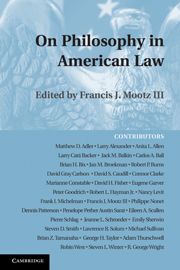Book contents
- Frontmatter
- Contents
- Introduction
- PART I KARL LLEWELLYN AND THE COURSE OF PHILOSOPHY IN AMERICAN LAW
- PART II PHILOSOPHICAL PERSPECTIVES ON LAW
- PART III AREAS OF PHILOSOPHY AND THEIR RELATIONSHIP TO LAW
- 12 On Philosophy in American Law: Analytical Legal Philosophy
- 13 Political Philosophy and Prosecutorial Power
- 14 On (Moral) Philosophy and American Legal Scholarship
- 15 The Aretaic Turn in American Philosophy of Law
- 16 On Continental Philosophy in American Jurisprudence
- 17 Psychoanalysis as the Jurisprudence of Freedom
- PART IV PHILOSOPHICAL EXAMINATIONS OF LEGAL ISSUES
- PART V LAW, RHETORIC, AND PRACTICE THEORY
- PART VI QUESTIONING THE RELATIONSHIP BETWEEN PHILOSOPHY AND AMERICAN LAW
- PART VII COMMENTARIES
- Contributors and Selected Bibliography
- Name Index
- References
16 - On Continental Philosophy in American Jurisprudence
Published online by Cambridge University Press: 31 July 2009
- Frontmatter
- Contents
- Introduction
- PART I KARL LLEWELLYN AND THE COURSE OF PHILOSOPHY IN AMERICAN LAW
- PART II PHILOSOPHICAL PERSPECTIVES ON LAW
- PART III AREAS OF PHILOSOPHY AND THEIR RELATIONSHIP TO LAW
- 12 On Philosophy in American Law: Analytical Legal Philosophy
- 13 Political Philosophy and Prosecutorial Power
- 14 On (Moral) Philosophy and American Legal Scholarship
- 15 The Aretaic Turn in American Philosophy of Law
- 16 On Continental Philosophy in American Jurisprudence
- 17 Psychoanalysis as the Jurisprudence of Freedom
- PART IV PHILOSOPHICAL EXAMINATIONS OF LEGAL ISSUES
- PART V LAW, RHETORIC, AND PRACTICE THEORY
- PART VI QUESTIONING THE RELATIONSHIP BETWEEN PHILOSOPHY AND AMERICAN LAW
- PART VII COMMENTARIES
- Contributors and Selected Bibliography
- Name Index
- References
Summary
What is it that Karl Llewellyn is asking for in “On Philosophy in American Law”? (He is clearly asking for something: he tells us that he has been “impatient” – his “wattles grow red” – waiting for a response.) Here is one way of reading the essay: it registers a complaint (that received jurisprudential accounts of American law provide an inconsistent hodgepodge of theories rather than a unifying panoramic synthesis), proffers an analysis and solution (realism), and concludes with an invitation for the reader to join the ranks of the enlightened few (the realists, whose thought “is a wedge that is opening up the future behavior of the guild” [Llewellyn 1934: 212]). That solution has turned out to be a resounding success, as the “the future behavior of the guild” has indeed fallen in line with Llewellyn's hopes and predictions. It has become a chestnut that “we are all Realists now.” Meanwhile, in the legal academy – Llewellyn's initial target audience – realism's scientistic offspring, law and economics and rational choice theory, along with various related species of neopragmatism, have assumed a dominant position among the various competing general theories of law.
This interpretation of Llewellyn's essay and its aftermath seems to me inarguable, if banal. Other readings are also possible, however, and I will attempt one such alternative here, a reading that suggests that Llewellyn's demand has not yet been fulfilled and that it therefore retains something of the critical edge that it had in 1934.
- Type
- Chapter
- Information
- On Philosophy in American Law , pp. 130 - 138Publisher: Cambridge University PressPrint publication year: 2009



